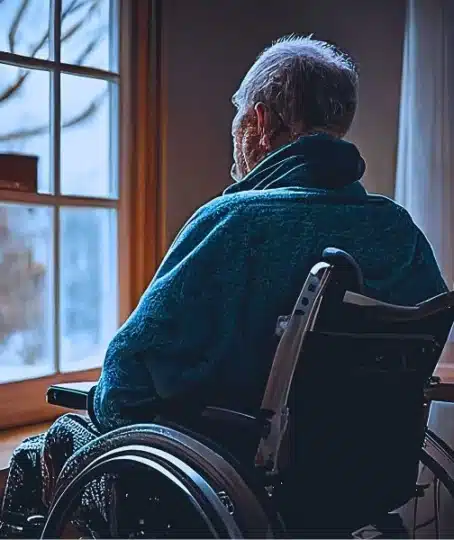
Overview of the Personal Injury Claim Process in Illinois No one expects to suffer an injury or get involved in...


Emotional abuse in a nursing home can expose elderly persons to life-threatening and lifelong consequences. Serious incidents of emotional abuse can even result in the wrongful death of a resident. Over time, abused residents may develop nervous disorders, such as anxiety, stress, and post-traumatic stress disorder (PTSD). These disorders can weaken their immune systems, making them susceptible to various infections.
Emotionally abused residents may develop clinical depression, begin to feel worthless, avoid relationships, and stop participating in activities they previously loved. Some residents may neglect themselves, refuse to take medications or follow doctor’s instructions, and even display suicidal tendencies. These changes in an elderly resident can increase the risk of developing new health problems or death. A nursing home abuse lawyer can discuss legal options available to you and what to do if you know or suspect your loved one is experiencing emotional or psychological abuse in a nursing home.
Call 309-393-2928 to consult a nursing home abuse lawyer at Strong Law Offices in Bloomington if your loved one is a victim of emotional abuse in a nursing home.

Emotional abuse constitutes conduct from a caregiver or employee in a nursing home that causes a resident to feel humiliated, frightened, abandoned, or subjected to mental distress or suffering. Emotional or psychological abuse in a nursing home may occur due to negligent hiring.
Failure to conduct thorough background checks may lead to hiring a caregiver with a history of subjecting residents to emotional abuse. It may also result in hiring a staff member with a criminal record or drug addiction problems.
Another cause of emotional abuse in a nursing home is staff shortage. Caregivers in an understaffed home are more likely to inflict emotional abuse on residents, as they know they can get away with it due to lack of supervision.
Overworked staff members may be tired and stressed most of the time, causing them to mishandle residents or ignore signs of abuse. They may also intentionally vent their frustrations and anger on innocent residents.
Nursing home employees are not the only perpetrators of emotional and psychological abuse. Residents could also subject other elderly residents to emotional abuse.
Examples of nursing home abuse that could affect your elderly loved one emotionally or psychologically include insults, humiliation, isolation from friends and family, and hiding necessary mobility devices like crutches and wheelchairs. Ignoring requests for help, denying requests for communication devices like telephone, and threatening a resident with physical or sexual abuse in a nursing home are other examples.
Emotional elder abuse can take numerous forms, including:
Common impacts of emotional abuse on residents' mental health include:
Residents who have undergone or are undergoing emotional abuse in a nursing home may become constantly worried about their safety and health. They may live in constant fear of experiencing psychological abuse from the people around them. This constant worry can cause them to develop frequent panic attacks characterized by sweating, rapid heart rate, and difficulty breathing.
Depression is another long-term psychological effect of emotional elder abuse. It involves continuously feeling sad and worthless. The victim may struggle to perform daily activities and show no interest in things that previously excited him or her.
Emotional abuse victims may feel responsible for what they went through or are going through in the nursing facility. They may assume that whatever they are going through is because of something they did.
Residents may adjust their eating patterns abruptly to cope with the abuse. They may also lose appetite due to anxiety and depressive disorders. The outcome will be a worsening of their overall physical health.
The awful experience of emotional abuse and the constant worry that it will occur again can alter a resident’s sleeping patterns. Lack of sleep can take a toll on the resident’s physical and emotional health.
Serious cases of psychological abuse can cause elderly residents to develop PTSD. They may experience intense emotional distress, vivid flashbacks, nightmares, and physical symptoms like sweating, chest pain, and nausea.
Residents undergoing emotional abuse are likely to develop suicidal ideation. The suicidal behavior may develop from social isolation, anxiety, depression, and feelings of hopelessness caused by the abuse. A 2014 study published in the National Library of Medicine found that nursing homes and other long-term care facilities tend to have higher incidences of suicidal feelings and attempts than the general population.
The emotional signs of abuse may be less apparent compared to physical abuse symptoms, but the impact on the victim is often unquestionable. To detect abuse, have a keen eye for details when you are around your elderly loved one, as abusers are good at ensuring victims remain silent about their suffering.
Do not ignore reports of emotional abuse from your loved one. Instead, evaluate the situation and report the incident to the concerned authorities. Consider having your loved one move to a safer environment or transferred to another facility.
Common emotional or psychological abuse signs among nursing home residents include:
Besides your loved one, emotional abuse signs or symptoms may show in the nursing home employees. The staff members may, for instance, keep you from seeing your loved one or talking with him or her on the phone. They may react rudely or refuse to answer your questions regarding your loved one.
Caregivers may look sleepy, fatigued, and stressed. They may shout at residents and mistreat them in your presence.
These signs are not ultimate proof that your loved one is experiencing emotional abuse in a nursing home. They could be symptoms of health issues or other problems affecting the resident. These signs are, however, grounds for investigating abuse in the facility.
As previously mentioned, you should move your loved one to a safer environment or another nursing home immediately after you discover he or she is undergoing psychological abuse. You should then get your loved one suitable treatment to prevent exacerbation of any current health issues. Treatment options for symptoms of emotional elder abuse include:
Seeing a mental health professional can help a psychologically abused resident cope with nervousness, fear, guilt, feelings of hopelessness, anxiety, and other symptoms of abuse. So, ensure your loved one attends counseling sessions regularly.
Medical treatment may be necessary if the abuse worsens a pre-existing physical condition or triggers a new health issue like severe headache, high blood pressure, and gastrointestinal disorders.
Prescription medications, such as anxiety drugs and antidepressants, can help alleviate anxiety or depression. Other medications may help an abused victim relax and get restful sleep at night.
Start working with a nursing home abuse lawyer shortly after you suspect or find out that your loved one is undergoing emotional or psychological abuse. The lawyer can help you and your loved one in the following ways:
Share as much information about the emotional abuse incident as possible with a nursing home abuse lawyer. The lawyer will review the details and establish if you have valid grounds for a nursing home abuse lawsuit. If the lawyer determines you have grounds to sue for emotional distress in a personal injury case and agrees to take your case, the lawyer will begin building your case.
Laws, regulations, and policies related to emotional abuse in a nursing home can be confusing to someone with little or no legal knowledge. Fortunately, a lawyer who has won many nursing home abuse cases knows these laws and can identify those relevant to your case. The lawyer can discuss these laws with you, explain your loved one’s legal rights, and advise you on your best legal option.
A lawyer can guide you in collecting evidence and gathering additional proof on your behalf. Evidence collection may involve recording video or audio clips of emotional abuse. A 2016 Illinois law allows nursing home residents to have electronic monitoring gadgets like cameras and microphones installed in their rooms.
The presence of a camera or microphone can help document the emotional abuse of your loved one in real time. Your lawyer can also obtain footage and audio recordings from surveillance cameras and monitoring devices installed in common areas within the facility where psychological abuse may happen. These areas include dining rooms, entertainment rooms, and physical therapy rooms.
Another way to collect evidence is to maintain a comprehensive personal log of the abuse. The log should constitute copies of written complaints sent to the nursing home administrator, an overview of discussions with caregivers, dates and times, and responses your loved one has provided to questions regarding the abuse.
Your lawyer will have questions for your loved one if he or she can and is willing to speak. The lawyer will also talk to residents and nursing home employees who may have information about your loved one’s abuse. Testimonies from credible witnesses are instrumental in assembling a robust claim for compensation.
Your lawyer will obtain records and documentation related to your treatment. The lawyer will then review these records and documents to identify signs of psychological abuse or neglect. A review of employment history and discipline documentation of a caregiver responsible for your loved one’s care could reveal patterns of abuse.
You can file a complaint with relevant agencies in Illinois if you discover your loved one was emotionally abused or is experiencing abuse in a nursing facility. A lawyer can guide you on how to report abuse in a nursing home. This reporting may involve filing a complaint with Adult Protective Services or notifying the police of the incident.
A knowledgeable lawyer knows the types of damages recoverable in a nursing home abuse lawsuit. Your lawyer will assess your situation and available evidence to calculate compensation covering all the damages, including current and future expenses.
Damages to your loved one may include medical bills, physical pain arising from emotional abuse, emotional suffering, and long-term care costs. Courts may sometimes award punitive damages in nursing home abuse cases. This is especially the case when the court finds the actions of the nursing home or its employees to be egregious.
A nursing home abuse lawyer will fight for your family’s best interests from the start to the end of the legal process. The lawyer will handle communications and negotiations with the nursing home management, attorneys, and insurance companies. If negotiations are unfruitful, your lawyer will skillfully present your case in court and push for maximum compensation.Was your loved one a victim of nursing home abuse in Chicago, Illinois? If so, Strong Law Offices in Bloomington is available to help you build a strong nursing home abuse claim and recover fair compensation. Contact us online or at 309-393-2928 for a free consultation with one of our lawyers.

Overview of the Personal Injury Claim Process in Illinois No one expects to suffer an injury or get involved in...

Exploring Caps on Damages in Illinois Personal Injury Cases Illinois does not have laws capping damages in successful personal injury...

For one of the top Peoria law firms to manage your case, contact Strong Law Offices at (309) 688-5297. Top...